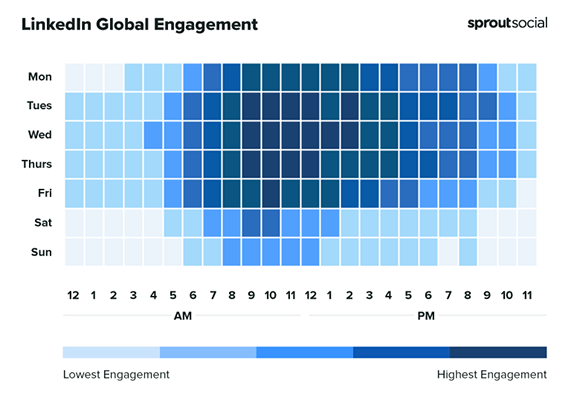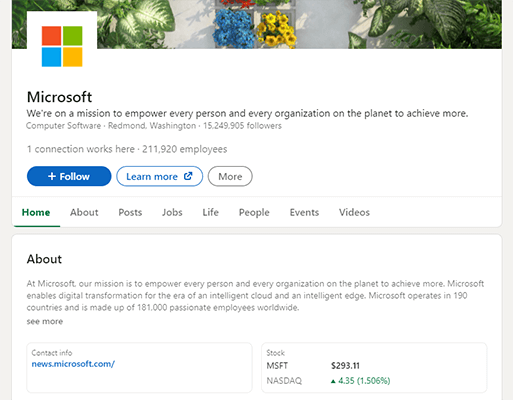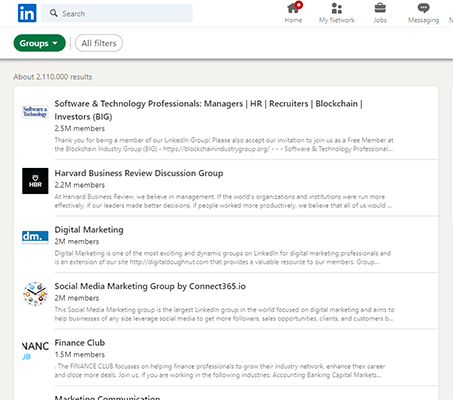Finding The Best Time To Post On LinkedIn: The Complete Guide
What is the best time to post on LinkedIn?
It might seem like an easy-enough question to answer.
But there’s a problem:
Nobody seems to agree on a universal best time to post on LinkedIn.
In this post, we’ve dug through all of the most credible research to find the best times to post on LinkedIn.
You’ll also learn how to get your own data so you can find the best times to post for your audience. Not someone else’s.
And for good measure, we’ll be covering the best ways to get more engagement on your LinkedIn posts as well.
When is the best time to post on LinkedIn?
As expected, we didn’t find a one-size-fits-all answer while doing our research. Every source of information we found has its own suggestion on what time you should post to get the most user engagement.
Let’s see what the most credible resources have to say about posting times for LinkedIn users.
Sprout Social
Sprout Social says that the best time to post on LinkedIn is Tuesdays to Thursdays from 9 AM to 12 PM.

When shouldn’t you post? Sprout Social says that Sundays are not optimal for LinkedIn posts.
Since LinkedIn is a career-centric platform, it makes sense that most of the interactions happen on weekdays during work hours. It also tracks that there’s much less engagement on weekends when people are away from work.
Hootsuite
According to Hootsuite, the best time to post on LinkedIn is 9 AM on Tuesdays and Wednesdays.
However, Hootsuite Social Marketing Strategist for Europe, Middle East, and Africa Iain Beable says that the pandemic has changed how LinkedIn users consume content on the platform. Traditionally, posts perform better during mornings, lunch, and evenings. But since the pandemic, activity has been more sporadic and spread out over the day.
To quote Beable, “The majority of our audience is in North America, so I tend to plan posts around early morning PST… We post at weekends, too, but at a reduced cadence, and later in the morning. I’ve actually been seeing improved engagement on Sunday evenings, too.”
HubSpot
People over on HubSpot recognize that there’s no one answer that’ll work for everyone. However, they say that marketers found success by posting around 8 AM to 2 PM from Tuesdays to Thursdays.
They go on to say that the worst time to post on LinkedIn is on weekends or anytime outside of business hours.
Finding the ideal posting schedule on LinkedIn
While all three sources offer slightly different answers, one thing’s for certain:
You want to post content Tuesdays to Thursdays around 9 AM.
You’ll have more luck reaching your target audience if you post during work hours. Since you’re dealing with working professionals, they’re more likely to be active on social media during work hours.
This is also the reason why posting on weekends might not work out for you.
However:
The ideal LinkedIn posting schedule as recommended by experts might not work for you. That’s because they are relying on their own data, not yours.
We’ll elaborate on this a bit further later on. For now, let’s look into how you can determine the right time to post on LinkedIn based on the industry you’re in.
LinkedIn posting schedule by niche
So far, we’ve talked about posting schedules for a general audience. But according to HubSpot, users will log into LinkedIn at different times based on what industry they belong to.
Here’s an example.
If you’re running a business and you’re using LinkedIn to sell directly to other businesses (B2B), you can post on LinkedIn during business hours. Why? Because there’s a great chance that your target audience will be online during those times. Business accounts on LinkedIn are usually managed during office hours.
However:
That’s definitely not the case for companies that are directly targeting consumers (B2C). Regular LinkedIn users will be pickier about when they go online on the platform. After all, browsing LinkedIn would be frowned upon if they do it while working.
So it’ll be better to post your content during lunch hours — either that or do it before work. People usually take coffee breaks early to mid-afternoon so it’s not a bad idea to schedule posts to go live then.
HubSpot further adds that those who belong to the software and media company sector will check their social media platforms in the morning. Those who are in the healthcare and education industries will want to try posting from 10 AM to 2 PM.
Do your own experiments
All these posting time suggestions are great. But there’s a catch — these are all based on someone else’s data. Meaning they’re using their audience to figure out when’s the best time to post on LinkedIn.
And what happens if you’re also targeting folks who live outside the United States? Having to deal with different time zones means the suggestions you just read won’t work since they’re too focused on the local US market.
They’re great starting points, for sure.
But wouldn’t it be better if you can use your own data so you can schedule posts based on when your specific followers are most active on LinkedIn?
Guess what? You can!
What you need to do is to conduct your own experiments and gather information about your audience’s LinkedIn habits. Using this method, you’ll gain all the data you’ll need to set up a posting schedule that works for you.
Why do people use LinkedIn?
LinkedIn is different from other social media platforms. While people use platforms like Facebook to connect with friends or for entertainment, LinkedIn is almost exclusively used as an employment and networking tool.
So if you want a better user engagement rate on LinkedIn, you’ll have to understand why people are on the platform to begin with.
That way, you can make adjustments to your LinkedIn marketing strategy to get more engagement.
Here now are some of the biggest reasons why people use LinkedIn.
People are looking for work
People use LinkedIn to find career opportunities. That shouldn’t come as no surprise. LinkedIn says that there are 81 job applications submitted on the platform every second — that’s more than 210 million job applications every month.

LinkedIn further adds that there are 40 million people using it to search for jobs each week.
These users then go on to use LinkedIn to research the companies that they are interested in. The platform allows you to see company information like its history, size, location, and its number of employees. You can even see if any of your connections are presently working there.

So as you can tell, LinkedIn users have a different mindset when they’re on the platform. Your followers expect to find information that can help their professional development. So your posts should reflect that.
Gear your posts toward career betterment so that your audience engages your content.
People are building connections
Building a rapport with other LinkedIn users is just as important when you’re trying to advance your career. That’s why job seekers are doing everything they can to get into the right circles. And employers—or their human resource department—are just as keen on discovering new talent.
If you want better social engagement, then you shouldn’t just use your LinkedIn account to post content. You should use it as a hub. Make it a watering hole where like-minded people can interact with each other.
Use the comments section to engage your connections in conversation. The more people you get talking to one another, the easier it will be for you to build a community.
People are looking for industry news
LinkedIn users will use the platform to receive and share news about their business and industry.
That’s because unlike other social media sites, LinkedIn users and their connections are likely interested in the same things. So there’s really no reason to hold back on sharing information that might seem mundane or uninteresting for their Facebook, Twitter, Instagram, or Pinterest friends.
Posting industry news that your contacts might find interesting will surely encourage more engagement. It could even earn reshares if you’re posting content that’s highly valuable to the community.
People build their brand
Some LinkedIn users aren’t necessarily looking for jobs. There are those that are in it to build a brand and promote themselves. These could include freelancers, influencers, motivational speakers, and small businesses.
Pretty much anyone who’d like to make a name for themselves will use LinkedIn for branding purposes.

You could help your contacts by organizing LinkedIn events—whether virtual or otherwise—that will make it easier for them to promote themselves on the platform. Not only will this boost your engagement rate, but you could find new leads for your own business in the process.
How to get better engagement on LinkedIn
Finding the right posting times on LinkedIn shouldn’t be your sole focus. You should also think about ways on how you can make your posts more engaging for your followers.
Being a professional social network, most of your audience will
Be consistent
When we say you should be more consistent, we’re not simply referring to your content calendar — though that is also a factor.
What you really want is to be consistent when it comes to your tone and message. You don’t want your LinkedIn posts to look like they were written by different people. And you don’t want to post contradicting content.
Stay true to your message.
Publish exclusive content
While republishing content from third-party sources can work every now and then, you should go the extra mile and give your contacts exclusive content.
This will accomplish several things.
First, publishing exclusive content makes you the go-to LinkedIn account for data that can’t be seen elsewhere. Second, it turns you into an authoritative figure in your community. Also, it’ll improve your credibility.
Exclusive content can refer to research based on your company’s data, case studies, behind-the-scenes look of your store, day-in-the-life posts, customer stories, and vlogs.
As a bonus, you won’t have to work as hard trying to promote your posts. Your contacts will seek you out once they know what you bring to the table.
Build a community
Your LinkedIn account will only thrive if you have a strong community. If all you do is publish content on the platform and nothing else, you simply won’t make it.
You need to communicate with your contacts. Answer their questions and post some of your own. Interact with them by also commenting on their content. You can send them emails or chat with them offline.
Why not meet with them through Zoom or Skype every now and then? That’ll be a good way to interact with your contacts on a deeper level.
Cultivate that community and you’ll see your engagement rates soar.
Give your LinkedIn profile a face
LinkedIn business accounts tend to use their corporate logo as their profile picture. While that isn’t bad in itself, it does make you seem a bit cold. When your contacts interact with your company, it doesn’t look like they’re talking to a real person.
That’s why you should consider using a personal account when replying to messages and inquiries. Let people know that you’re part of the company they’re following. Putting a face behind the brand is a good way to encourage more interaction.
Find new contacts through LinkedIn groups
LinkedIn makes it so easy to find groups that are related to your industry. Use these to not only find new leads but to promote your work as well. If you really know what you’re talking about, you can participate in discussions and get recognized as a subject-matter expert.


There are millions of groups you can join. All you have to do is to join the groups where you think your target audience is. There are filter options available on LinkedIn to help you narrow down your options.
Edit your posts
Being a professional network, LinkedIn users have a higher standard when it comes to the quality of the posts they read. A simple misspelling can turn off users and lessen your credibility.
That’s why you should proofread your posts before publishing and edit your work as needed.
Of course, this goes beyond correcting spelling mistakes. Your information also needs to be accurate. And when quoting someone, don’t forget to cite your sources.
If your posts are free from errors, they’ll get more traction on LinkedIn which will help your engagement rate.
Conclusion
Most resources conclude that the best time to post on LinkedIn is Tuesdays, Wednesdays, and Thursdays around 9 AM.
But that’s based on someone else’s data. These are only meant as a starting point. If you want to know the best times to post on LinkedIn, you’ll have to use your own audience data. Not someone else’s.
Not only will it be able to tell you the time, but it’ll tell you which days are the most optimal for posting. However, you’ll need to do a ton of research.
So, for the time being, start with the data we shared above.
Disclosure: If you buy through links on our site, we may make a commission. This helps to support the running of Software Feedback Hub.

